
The healthcare app industry is booming, and there’s no doubt that it will continue to grow in the upcoming years. In today’s digital era, when people are busy – mHealth mobile apps can immensely help them keep their medical records organized, track health while on-the-go.
Most popular categories of healthcare apps
Two major categories of healthcare apps include healthcare apps for patients and health practitioners. The latter is meant for people engaged in medical activities such as doctors, healthcare providers, medical attendants, etc. Though most healthcare apps deal with personal data, they benefit both- the patients and the doctors to a reasonable extent.
Here’s the list of some popular categories of healthcare apps
Chronic Care Management Apps Chronic Care Management Apps have had massive success in recent times. The reason could be a drastic increase in the number of patients suffering from chronic conditions such as heart diseases, diabetes, hypertension, etc. Living with chronic concerns is challenging; chronic care management apps can immensely help though.
Hospital Apps Healthcare mobile apps for the hospital contains hospital-specific information, details of panel doctors such as name, department, availability, etc. Advanced hospital apps often provide a visual tour of the hospital, along with updates on registration details, and waiting times to meet the consultant physician.
Healthcare and Fitness Apps Apps that allow you to keep track of your health and fitness levels have become popular. Using these apps, you can accomplish and keep track of particular health goals. You can keep track of the calories you have burnt and the weight you have shred.
Amidst the pandemic, the COVID-19 healthcare and fitness tracking apps bring along a relief as they are capable to trace the infected person and help notify those who are in close proximity to the infected person in the past 15 days.
Women’s Health Apps These apps focus on women’s health and allow them to get quick information on menstruation cycle, schedule appointments, educate about fertility, various stages of pregnancy, baby birth, breastfeeding, newborn care, and much more.
Medication Management Apps Medication management apps manage your medication-related tasks, such that reminding you about the next dosage and providing you a brief on every day’s medication. Medication on time means prompt recovery from critical diseases, and this is what these apps focus on.
Personal Health Record Apps These apps help patients in organizing and managing all their medical records in one place. Patients can share their medical records with their healthcare providers right from the app.
Emergency/ Urgent Care Apps Urgent Care apps give information about the nearest hospital, clinics, list of doctors along with the direction to that particular healthcare point. These apps are beneficial at the time of emergency as they help reach to the nearest healthcare centers quickly.
Elderly People Medical Apps Elderly people medical apps facilitate monitoring health progress, identify symptoms, reminding prescribed medication, track heart rate or blood pressure, check nearby healthcare centers, contact healthcare provider, contact the emergency helpline, locate a pharmacy or medical equipment stores, etc.
Healthcare eCommerce Apps These apps are the next big thing in the mHealth marketplace. Since people have become more vigilant to their health, they want to stay attentive all the time. These apps allow people to buy anything and everything online quite instantly right from a single panel.
How are mHealth applications revolutionizing the healthcare industry?
Statista states that the global mHealth market is estimated to reach about 332.7 billion US dollars in 2025. These figures explain how m-health apps will revolutionize the healthcare industry in the upcoming years. With better communication, quality services, efficient functionality, and paperless processing, mHealth apps have become a valuable asset for patients and healthcare providers as well.
Nowadays, COVID tracking apps are playing a major role in curbing the pandemic by tracing the infected person, issuing self-quarantine guidelines, sharing the latest COVID related information with the citizens, etc. Aarogya Setu, developed by the Indian Ministry of Electronics and IT to notify users about COVID related information and updates is high in demand. The app is multi-lingual and is available in 11 different languages which makes it more scalable among Indians.
Today’s mHealth apps integrate accurate health trackers, payment APIs, chatbots, up-to-date health-related information, and much more. These attributes make them efficient and functional than ever before. Several features that make mHealth apps innovatively revolutionary are:
- Ability to connect to wearable devices
- Seamless IoT endpoint integration
- Artificial intelligence
- Security over the patient’s data
- Paperless documentation
- Reduced healthcare cost
- Prompt healthcare services
- Uncomplicated medical tests and reports
How to avoid healthcare app failures?
Avoid failures in mHealth application development by taking note of the following best practices:
Develop Secure & Privacy Compliant Apps To avoid mobile app security and privacy failure concerns, the healthcare mobile app developers need to be receptive while developing the app architecture. It is essential to prioritize the privacy and security aspects and control who can have access to the patient’s critical information via rights, permissions, etc.
Design App with Great User Experience An interactive user experience guarantees the success of mHealth application. Make sure that the content, images, graphics, presentations, statistics, information, and other elements of the healthcare application are up-to-date and original. Smooth navigation ensures that the user lands to the right information in the minimum time.
Solve Real User Problems mHealth application should be developed and designed, keeping in mind the purpose that it focuses on resolving. The architecture of the application must be designed carefully as it is the keystone that ensures the application success rate.
Flawless & Error-Free Functionality Error-free functionality is unarguably a vital aspect of any application. A healthcare mobile app must work flawlessly- irrespective of the platform. The app must not contain any technical issues or concerns as it would significantly affect the user experience.
Features for healthcare mobile app development
Manage EHR (Electronic Health Record) Electronic Health Record (EHR) is a must-have feature for mobile healthcare apps as it stores and manages patient records and data into a centralized system.
Wearable Device Connection The users of mobile healthcare apps often agree that the introduction of wearable devices with activity trackers made them more conscious about their health and related concerns.
Cloud-Based Data Storage Cloud Storage had made the information available on-the-go. Patients do not have to care about their medical records as they can save their documents, including medical history, prescriptions, test reports, scan reports, etc. on the cloud. They can share it with their doctor as and when required.
Security Data security and information privacy are undeniably the most crucial aspects while installing or using healthcare apps on a mobile device. mHealth apps must integrate advanced algorithms that guarantee complete security over the user and device data.
IoMT We are living in the era of IoMT; therefore, it is crucial that your healthcare app must leverage IoMT connectivity to keep up with the pace of technological innovations.
Website Interoperability The healthcare mobile app must integrate a custom API to ensure syncing to the existing web app. It will enable the user to share data to-and-fro the mobile app and web app.
Video Consultation The app can allow the use of the device camera for video conferencing. It will help the patient and doctor during emergency situations.
Reporting & Analytics Analytics provides quick insight into app performance, user behavior, network issues (if any), etc. It helps developers in improving the app feature.
What are the challenges in developing healthcare mobile apps?
mHealth apps differ from other apps available in the market. Since healthcare apps deal with patient’s critical data and medical details, data security, and patient privacy are of utmost importance. Compliance with legal, medical norms is crucial to ensure that the app is not promoting an unhealthy lifestyle, or not violating any health laws.
Cloud integration is the need of the hour to ensure anytime and anywhere accessibility; therefore, it is vital to audit cloud infrastructure on regular intervals to provide unmatched security.
Popular healthcare apps amid COVID-19
1. Aarogya Setu The app is high in demand and has been downloaded by more than 50 million users within 2 weeks of launch. The app tracks if the user has crossed paths with a Corona positive patient.
2. The Corona DataSpende A German smartwatch app that collects pulse rate, sleep patterns, and body temperature to monitor the spread of Coronavirus.
3. COVIDSafe Launched by the Australian Government, the CovidSafe app traces each user running the app, and this helps to detect the people who have come in close contact with Covid-19 positive individuals in the past few days.
Link: (Android | iOS) Also read about: 5 Apps Reducing Pollution and Traffic
4. GoodRx This app compares the prices of the medicines across pharmacies and allows you to find and purchase drugs at remarkably lower prices.
5. MyChart The app enables the patient to communicate with their healthcare providers, manage appointments, request prescription refills, and access the test results conveniently.
6. Healow This app allows the users to find a doctor in a specific specialty in just a few clicks right in the nearby area.
7. Teladoc Teladoc is an innovative mobile app that allows the patient to talk to a doctor efficiently.
8. Pregnancy+ Pregnancy+ enables pregnant women to keep track of their pregnancy progress -week by week. 3D models and useful information educate pregnant women at every step of this beautiful phase.
9. Health Mummy Focuses on women’s health, especially mothers, by encouraging them to reduce weight, stay fit, and feel confident.
Role of TechAhead to build a healthcare mobile app
Reach out to us for comprehensive mHealth mobile app development, starting from developing app strategy, UI/UX design, mobile app development, and testing. We have the best in class technology experts to get all your mHealth app development requirements covered.
TechAhead, a leading mobile app development company is known to deliver high quality mobile apps for all platforms and frameworks. Contact our experts now to take your business to the next level.


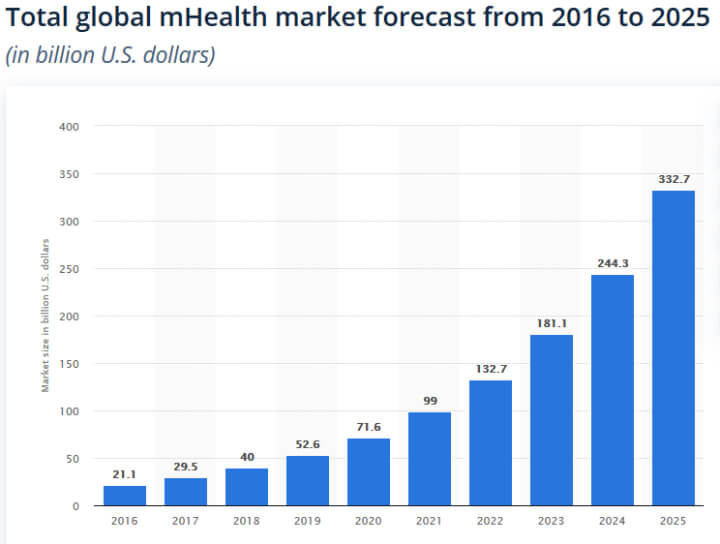
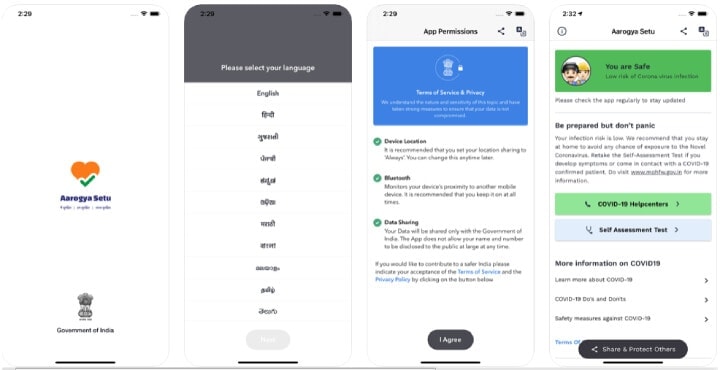
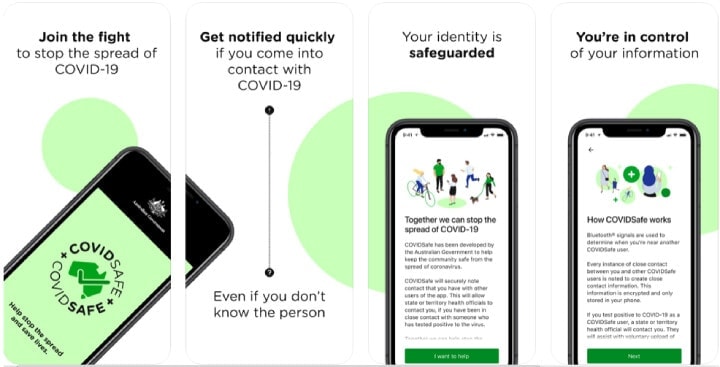

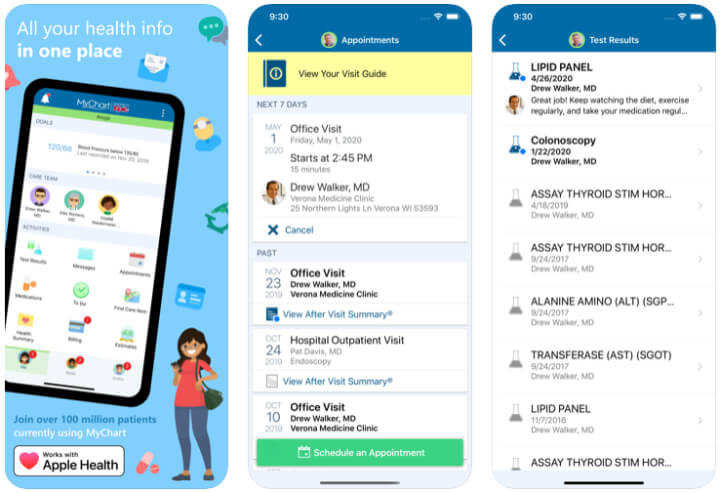
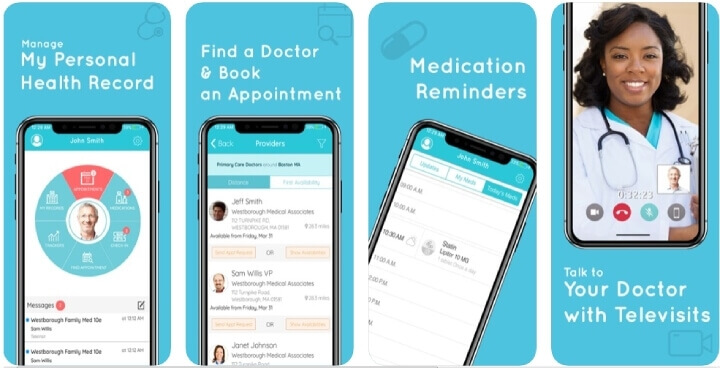

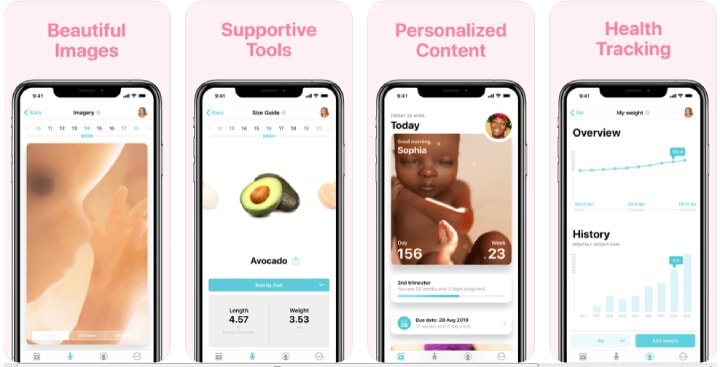
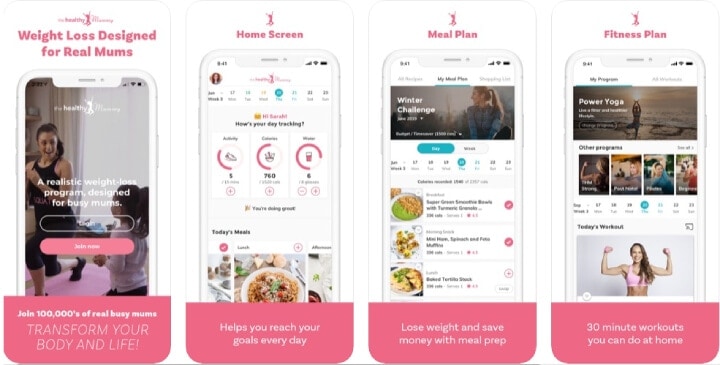


![Turbocharge Your Mobile App with AI: 7 Integration Strategies [Infographic]](https://tamediacdn.techaheadcorp.com/wp-content/uploads/2024/03/16034248/Screenshot-2024-03-28-at-2.30.22%E2%80%AFPM.png)